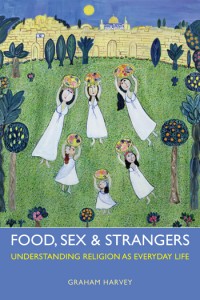Now and again, academics need to ponder the use of the words that appear to define their disciplines. Anthropologists have worried about “culture”, while “literature” has been debated in English. It isn’t that we claim ownership of particular topics, or that we think we have privileged access to phenomena that interest us. Usually the opposite is true. It’s possible to discuss everything as “culture” or “literature”. Scholars often revel in fertile debates when different disciplines say something provocative or fresh. Scholars of religion have been vigorously debating the meaning of the term “religion” recently. We’ve been considering where the boundaries lie between religion and whatever is “not religion”. Perhaps there are no boundaries. Those who are “not religious” (whether because they define themselves as “spiritual but not religious” or as atheists or secular humanists) often say or do things that clarify what it is that the study of religions focuses on.
Colleagues in the OU’s department of religious studies have gained understanding of the activities and ideas of people who are identified (by themselves or others) as members of many religions. We don’t think of these as monolithic and boxed entities but as diverse and fluid movements. While we pay attention to what people say particular religious texts (“scriptures” or “creeds”) teach, we are far more interested in what people do. Religion as lived realities is what fascinates us. Religion doesn’t live in boxes or books even when religious people try to make or enforce boundaries. For these and other reasons, we are interested in the dynamic ways in which activities that might be “religious” are braided in with other social phenomena. These include (but are not limited to) gender, politics, security, consumption, ethnicity, age, citizenship, sexuality, belonging (to places or communities), movement (e.g. pilgrimage and tourism), material and performance cultures (e.g. rituals, music, drama, statuary, book writing and book burning, costuming) and much more.
My most recent contribution to debates about the meaning and nature of religion is a book called Food, Sex and Strangers: Understanding Religion as Everyday Life (Acumen 2013). This is based on fieldwork research among indigenous people (especially Maori, Native Americans and Yoruba) as well as among Jews and Pagans and others. I question whether these dynamic and diverse communities have anything in common that we should call “religion”. I explain why I think it’s time to utterly reject the idea that religion is fundamentally about “belief in god(s) or spirit(s)”. I discuss other ideas, like that of the late Maori scholar T.P. Tawhai who wrote that “the purpose of religious activity among my people is doing violence with impunity”. This is a rich phrase and, in part, resonates with Charles Darwin’s recognition that humans are related to all other species in this evolving planet. I experiment with Tawhai’s argument that religious rites can acknowledge and honour human kinship with those beings who we kill and eat. This might not be the whole of religion but contemplating it touches many other debates about the evolution, nature, performance and relevance of religions in the contemporary world.
Dr Graham Harvey

